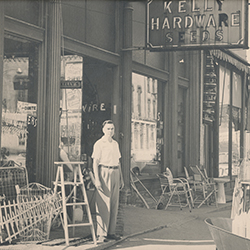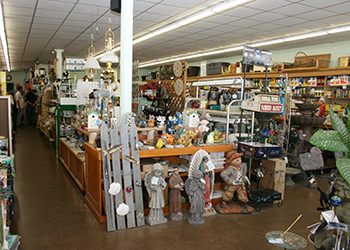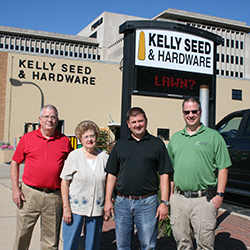Through wars, depressions, natural disasters and radical change, Kelly Seed keeps the focus on its customers.
With the advent of big-box retail in the 20th century, family businesses across the country began to feel the heat of competition. Many eventually closed their doors, the casualties of cheaper prices, sophisticated global supply chains or novel technologies. The names of these establishments—once painted in large block letters across brick buildings—have faded into ghostly reminders of bustling downtowns long past. Yet one Peoria store, Kelly Seed and Hardware, has not only remained, it has flourished.
Its history spans an entire century: through wars, economic depressions, natural disasters and radical changes in technology and transportation. Though the business bears the name of its founder, W.G. Kelly, it is the Church family who continues its legacy. Harold and Helen Church’s purchase of Kelly Seed in 1936 created generations of employment for the family. Today, their children, Steve Church and Nancee Church Vespa, preside over the business as president and vice president, while two of their grandchildren, Nick Vespa and Matt Church, co-own and manage the business. Their story is one of hard work, foresight, and above all, undeniable ties to their customers.
Navigating the Journey
The story begins about 30 miles south of Peoria in San Jose, Illinois, where W.G. Kelly was building a reputation as one of the area’s most prominent business owners. In this small village, split along the Mason/Logan county line, the Kelly surname was affixed to a furniture store, a hardware store, a grain elevator and several local farms. As his San Jose businesses grew and expanded, Kelly opened a new store in a new city in 1905—in a building along Washington Street in Peoria, where the Peoria Riverfront Museum stands today. To this new business he brought the same traits that were a hallmark of his other businesses: honesty, a commitment to fair prices and good customer service.
Three decades later, the fate of Kelly Seed was sealed. It was 1936: the Great Depression had been bearing down on the U.S. economy for seven years. Though employment options were sparse, a young man from Stark County was determined to find a job. Just out of business college, Harold Church was intimately familiar with the needs of area farmers. When he walked through the doors of Kelly Seed’s Peoria store seeking employment, he was hired right away as a secretary and clerk. What was originally intended to be a temporary position became a lifetime of employment—and during the 20 years he worked for Kelly, Church never once missed a day of work.
In 1956, Kelly decided to sell and close his Peoria store, which created a crisis for Harold and Helen Church. “I can remember that this was a very scary time for our family,” notes their daughter, Nancee. “It was the only business he knew.” Church was able to persuade Kelly to sell him the business’ inventory, but the building was not included in the deal. And so, the Churches needed to find a new home for the business. Though it meant that Helen would have to give up her dream of a new home, they eventually found a building just down the street. And when Kelly’s flagship store in San Jose closed, the Church’s store became the most prominent supplier of seeds for central Illinois farmers.
But the complications of business were far from over. In the early 1960s, Caterpillar decided to build its world headquarters on the block where the business had only recently relocated. After some difficult negotiations, the Church family once again had to find a new location. The store moved down to the corner of Washington Street and Hamilton Boulevard, where it still stands today.
The Customer Bond
Walking into the store in 2015 is much like it was in the 1920s and 1930s: customers chatting in corners, farmers running their fingers through seed pans, and families looking at bird feeder options. For many locals, a trip to Kelly Seed means far more than purchasing seeds or tools: it’s an experience. “Families think of [it] as an outing when they come here,” explains Steve Church, “which makes it fun, too.”
“We have a lot to look at,” adds Nancee. “We’ve just been very fortunate through the years with the types of customers we get: farmers, bird lovers, people who put in gardens, people who want to decorate and customers looking for grass seed.”
T hat appeal to a wide range of gardeners, both rural and urban, lies in part with the shop’s diverse inventory, as well as its fair prices. While seed catalogues and big-box stores carry many of the same items, Kelly Seed offers a number of competitive advantages. “People come for our bulk garden seeds because they are a fraction of the cost than through mail order,” notes Nick Vespa.
hat appeal to a wide range of gardeners, both rural and urban, lies in part with the shop’s diverse inventory, as well as its fair prices. While seed catalogues and big-box stores carry many of the same items, Kelly Seed offers a number of competitive advantages. “People come for our bulk garden seeds because they are a fraction of the cost than through mail order,” notes Nick Vespa.
“We dip out the garden seed—you know, like green beans—we’ll put them on a pan,” Steve adds. “People like to look at it and put their fingers through it. ‘Give me a little more, a little less…’ Customers like that.”
In speaking with the Church family for just a few moments, it’s obvious they have a unique relationship with their customers. Not just anonymous faces, old and new customers alike are greeted with smiles and handshakes—and they depend on the family’s expertise. “That’s why people come to us,” Nick adds. “They know they can get answers here.”
It is this bond with their customers—and constant evolution to meet their needs—that has helped the family business weather change over the years. “I find so many retailers who try to focus on one or two things, and if times change, they have trouble,” Steve says. “But we keep going in different directions. Every time the climate changes, we change with it.”
At one point, for example, nearly half of their inventory was hardware; today, it’s less than 10 percent. The culprit: changes in the custodial staff in downtown buildings. Where Kelly Seed once supplied hardware materials to local custodians, third-party service companies now bring in their own hardware. “You’ve got to diversify and move with the times,” Steve observes.
With millennials taking up gardening in ever-greater numbers, they are the shop’s newest customers. And as always, Kelly Seed is ready to respond to their needs, with plans to offer new options for rooftop gardens, allowing city dwellers to experience the same joys of gardening. But the family gets just as much satisfaction out of helping customers as customers get from their services: “We’re fortunate” is the sentiment repeated over and over again.
A Peoria Institution
As the 21st-century economy continues to evolve, the Church family moves steadily with it. Kelly Seed is now a Peoria institution, and as businesses begin to return downtown, it plans to become an even more integral part of city commerce. When Caterpillar began to plan its new world headquarters, it approached the family about moving once again, but they decided to stay. “We are better off here,” says Nick. “We have such a loyal clientele, and we are known for being downtown.”
As for the family itself, working with one another has never been a problem. “One thing I learned working with my father over the years is that sometimes we would have disagreements,” Steve recalls. “But when we went home, we were father and son again.”

“Fortunately we get along,” Nancee adds with a smile. “Most of the time. Otherwise, it wouldn’t be worthwhile to work!”
This camaraderie within the Church family—and the personalized service they provide—keeps a diverse base of customers returning through the seasons: for spring planting, summer weed control, autumn grass seed and winter bird seed. As Nancee explains, “It’s for the townsfolk; it’s for the farmers; it’s for the bird lovers; it’s for the food plot business; and even for specialty items.”
And as first-time shoppers become repeat clients, this tight connection with their customers develops into something even more: friendship. “After a certain time, they become our friends,” Steve explains. “We know them by name. They feel at home—that they’re not just a number, like at many retailers.” iBi


